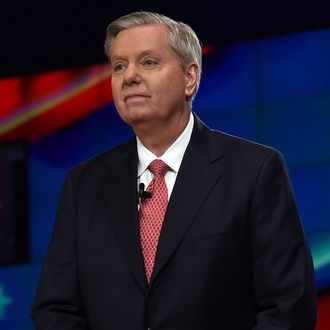
He never came within hailing distance of viability. So when Lindsey Graham announced today that he was folding his presidential campaign, any bets on the identity of the next candidate to be “winnowed” from the still-giant field have been settled — but no one was terribly surprised. The efficient cause of this decision was the filing deadline for the primary in his home state of South Carolina. Since he was running a poor ninth there in the RealClearPolitics polling averages, he will presumably be able to keep his name off the ballot and avoid humiliation. And perhaps he can confer a valued endorsement in what could be a close and crucial early primary.
The general impression when Graham jumped into the race was that he wanted to serve the neoconservative cause by providing a steady diet of daily attacks on his Senate colleague Rand Paul, once thought to be a serious threat to win the nomination, for the quasi-libertarian’s quasi-non-interventionist views. As it happens, Paul’s not in much better shape than Graham in the presidential contest. And probably to his immense satisfaction, Graham’s Chicken Little panic about ISIS has spread widely through U.S. public opinion, even as implicit faith in the “flypaper” theory of killing ‘em there so they cannot kill us here has captured much of the GOP.
We haven’t heard much about Graham’s other professed principle he hoped to advance in a presidential bid: the need for bipartisanship. But I guess the very idea faded in Graham’s own mind as he regularly denounced the president and other Democrats as gutless sellouts whose weak, weak, weak reluctance to rattle sabers was inviting the world’s bad guys to work their evil wills on us in every direction.
In conventional terms, Graham has served as a stalking horse for Establishment/neocon favorite Marco Rubio, and it would not surprise anyone if he gets Graham’s endorsement. Beyond that, he and amigo John McCain can almost certainly get as much attention pounding Donald Trump and Ted Cruz — who for all their lethal rhetoric about Muslims and vaporizing ISIS’s whole neighborhood seem reluctant to relaunch the Iraq War — in the Senate as Graham has been getting in “undercard” debates.
And speaking of those “undercard” debates, Graham’s withdrawal from the race almost guarantees debate sponsors will find a way to end those consolation events, whether or not the senior senator from South Carolina is soon followed across the political River Styx by Rick Santorum, Mike Huckabee, George Pataki, and perhaps others. He stood for a mix of jollity and bloody-mindedness that fit the current mood of his party better than his individual policies. Without him, there’s no point in offering an unhappy hour of rhetoric before the red-meat feast of the main candidate debates.






























